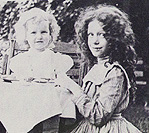Family Folklore
How to Collect Your Own Family Folklore
The People You Interview
 With whom should you start?
With whom should you start?
Your oldest relative?
The one you feel most at ease with?
No.
The place to begin is with yourself.
You are just as much a bearer of your family's traditions as
any member of your family. Use yourself as an informant and ask yourself
the questions that follow. You may be surprised at how much you know about
some areas and how little about others. It is very likely that you will
know more about one side of the family than another, for instance. Once
you have collected family folklore from yourself, use your answers as a
starting point for questioning other family members. Try to remember family
structure. Who are your relatives? Which ones are most likely to have information
and be willing to share it? Who gets along with whom? What topics are likely
to be sensitive? These are all essential questions that you have to tackle
yourself, first.
The first outside person that you interview should be someone with whom you feel very comfortable. Interviewing is not easy and you would do well to get your introduction to it in the presence of a friendly face. A parent or sibling might be a good choice. Young children often have great success with grandparents.
As you continue your interviewing you will pick up clues that will help you find potential narrators: "You should talk to Uncle Joe about that," or "Aunt Jane is a much better storyteller than I am." Whenever possible ask directly for sources: "Can you tell me who might know more about that?" As you become more and more involved with the search you will meet relatives that you never even knew you had! Don't neglect non-relatives, either. Your grandfather's best friend may be able to tell you things about him that no family member would know. Don't overlook other members of the household who were not relatives, such as nursemaids or long-term boarders. Try not to be misled by terms of address. Aunt, uncle, sister, brother, and cousin are especially troublesome words since they can indicate respect, affection, and brotherhood as easily as blood or marriage relationships. And although they won't be much help as sources of information on family folklore, don't forget family pets since they can frequently be found as characters in family stories.